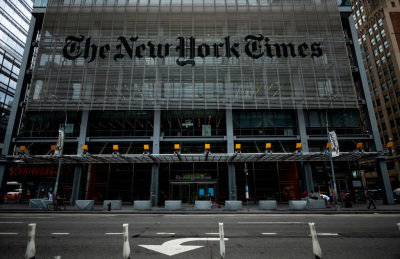The New York Times' Evangelicals

Spanish dictator Francisco Franco regularly read The New York Times because he amusingly thought it the voice of international Freemasonry, historic nemesis to his preferred rightwing continental Catholicism. The Times has long had totemic status often beyond reality. So there’s no surprise that David Brooks’ recent Times piece on reformers within Evangelicalism got a wide response. He spotlighted some Evangelical dissidents whom some conservative evangelicals disparage as panderers to the zeitgeist as embodied by the Times.
Evangelicals get lots of secular media attention because, in our ostensibly more secular age, they have significant political power as a fairly cohesive voting bloc that often goes 80% Republican. They are almost as cohesive as black Christians, who typically vote 90% Democrat, but white evangelicals are more numerous.
Coastal elites have disdained evangelicals and revivalists across 200 years, per John Adams’s correspondence with Thomas Jefferson. They have long seen the backcountry unwashed as reactionary and unsophisticated. Contemporary evangelical traditionalist views on human sexuality and abortion make them especially disdained by liberal and secular elites.
Recent national polarization naturally has affected evangelicals as with all demographic groups, especially relating to Trump, January 6, “Christian nationalism,” the pandemic and vaccine, conspiracy theories, race and law enforcement, and populist politics. Some Evangelicals, including many leaders within academia and publishing, including persons whom Brooks spotlights, recoiled from the recent evangelical politics, which they saw as departing from traditional Christian public concerns during the Bush and Reagan eras. As Brooks noted, there is also distress about sexual abuse in the church, with some evangelicals blaming failures of accountability on excessive deference to authority and sometimes misogyny. According to Brooks:
"Power is the core problem here. First, the corruptions of personal power. Evangelicalism is a populist movement. It has no hierarchy or central authority, so you might think it would have avoided the abuses of power that have afflicted the Roman Catholic Church. But the paradox of decentralization is that it has often led to the concentration of power in the hands of highly charismatic men, who can attract enthusiastic followings. A certain percentage of these macho celebrities inflict their power on the vulnerable and especially on young women."
And also:
"Then there is the way partisan politics has swamped what is supposed to be a religious movement. Over the past couple of decades evangelical pastors have found that their 20-minute Sunday sermons could not outshine the hours and hours of Fox News their parishioners were mainlining every week. It wasn’t only that the klieg light of Fox was so bright, but also that the flickering candle of Christian formation was so dim."
In 2020, roughly 40% of the people who called themselves evangelical attended church once a year or less, according to research by the political scientist Ryan Burge. It’s just a political label for them. This politicization is one reason people have cited to explain why so many are leaving the faith.
Two important points here. First, non-evangelicals sometimes assume based on stereotypes that evangelical churches are hotbeds of political activism. But they very rarely are. Most evangelical preachers avoid detailed politics from their pulpits. Almost all evangelical activism originates outside the church. Second, “evangelical” has become a moniker for political and cultural identity rather than a theological description. Some non-Christians, including Hindus and Muslims, and non-religious people, now tell pollsters they are “evangelical” because they identify culturally and politically with the movement.
Brooks cites New York pastor and author Tim Keller’s ideas for church renewal, which include a renewed emphasis on church planting and campus ministry, better catechesis, shaping intellectual leaders in academia, and creating a "Protestant social teaching," similar to Catholic public theology, but "Protestant versions might share 75% of its ideas, while being perhaps less hierarchical and more individualistic."
Keller’s citing evangelism is most important. Christianity is demographically declining in America even as it grows globally. Every American church should be evangelistic, which is not only countercultural in society but increasingly countercultural within American Christianity. The word itself is often discomfiting. But winning lost souls is the church’s first goal in every time and place.
Also important is Keller’s citation of catechesis. Evangelicals must, to survive, uphold sound doctrine. Mainline Protestantism’s inexorable decline evinces the bitter and deathly fruits of theological liberalism. The New York Times rarely spotlights Mainline Protestants because they have made themselves societally irrelevant. Lest there be any doubt, recent Evangelical congregations that, with much ado, abandoned traditional Christian sexual teaching quickly imploded. Cleaving to historic Christian ethics is deeply controversial. But discarding them is disastrous for the Church.
To my knowledge, only one of the personalities whom Brooks cites has publicly indicated any move away from traditional Christian sexual teaching. If she follows that journey, she will have left Evangelicalism for liberal Protestantism. A renewed Evangelicalism must stick with universal Christianity on doctrine and ethics while stressing traditional Evangelical strengths of evangelism and pragmatic entrepreneurship. Evangelicalism is growing globally, and it is growing among immigrants in the U.S., by stressing personal dynamic faith in Christ with traditional doctrine.
New York Times and other secular coverage of Evangelicalism, favorable or not, recognizes that Evangelicalism remains a major dynamic force in even a less formally religious America. A robust, strong, and healthy Evangelicalism serves the interests of everyone who cares about a robust, strong, and healthy American democracy.
Originally published at Juicy Ecumenism.
Mark Tooley became president of the Institute on Religion and Democracy (IRD) in 2009. He joined IRD in 1994 to found its United Methodist committee (UMAction). He is also editor of IRD’s foreign policy and national security journal, Providence.



























